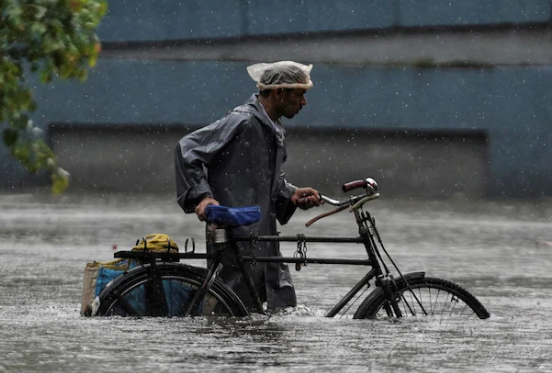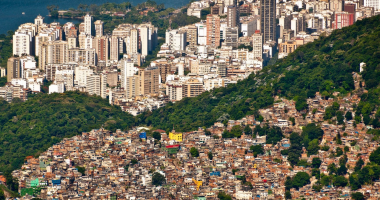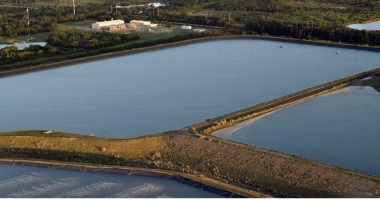Climate, Health and Equity Brief
Epic rain, massive floods and lurking radiation
August 14, 2020

The Climate, Health & Equity Brief is GMMB’s take on the week’s news on the current impacts of climate change. If you haven’t subscribed yet, you can do so by clicking here.
Hot Topic: International climate woes. Two major reports and a number of global developments this week offer troubling insight into the progression of climate impacts around the world. The 30th annual State of the Climate Report from the American Meteorological Society found that 2019 was the third hottest year in human history behind 2015 and 2016. In addition, greenhouse gas concentrations and sea levels rose to all-time highs, highlighting the direct influence of planet-warming emissions on key climate indicators. And despite initial optimism around lowered emissions during COVID-19 lockdowns, another report revealed that the long-term climate impact from the shutdowns will be a mere 0.01°C reduction in global temperatures, demonstrating the continued need for urgent climate action.
In India, severe climate change consequences are already on full display. Mumbai, one of the country’s most populated cities, is facing a devastating monsoon season that has caused catastrophic flooding and displaced four million people after nearly 83 inches of rainfall in just over one month. Despite this, India’s government has announced plans to establish 40 new coal mines to boost the country’s economy following COVID-19. This project would destroy indigenous lands, clear more than 400,000 acres of forest and exacerbate extreme weather events such as the Mumbai monsoons.
Meanwhile, scientists are bracing for another environmental catastrophe in Chernobyl. The city, which was left almost completely abandoned after a horrific nuclear power plant explosion in 1986, is now overtaken by forest. With warming temperatures expected to intensify the impending wildfire season later this month, potential blazes would release lethal amounts of radioactive toxins into the atmosphere and lead to grave health implications for surrounding populations.
Here in the U.S., and despite the aggressive environmental rollbacks of the last four years, there are signs of hope. Democratic nominee Joe Biden has chosen environmental justice champion Kamala Harris as his running mate, and a new report notes that 41 U.S. states managed to cut carbon emissions between 2005 and 2017, even as their economies grew.
—Matt & Traci, GMMB
Health
The 30th annual State of the Climate Report revealed that last year was the third hottest in human history, with greenhouse gas emissions and sea levels rising to all-time highs. (The New York Times, Climate.gov)
An unprecedented monsoon season has pummeled Mumbai, India with 82.5 inches of rain since early July, inundating the city with devastating floods after nearly reaching its annual average rainfall in just one month. (The Washington Post)
The Red Forest that has overtaken the abandoned town of Chernobyl, site of the 1986 nuclear disaster, is increasingly threatened by warming temperatures and an impending wildfire season that would release lethal amounts of radioactive elements back into the atmosphere. (The Atlantic)
Phoenix, Arizona is having its hottest summer ever, with temperatures reaching 115°F and a record 35 days in a row of temperatures at or above 110°F so far this year. (The Arizona Republic, The Hill)
Equity
Despite falling demand for coal, India announced plans to boost its post-COVID-19 economy with 40 new coal mines that will destroy indigenous lands and clear 420,000 acres of forest. (The Guardian)
A California bill meant to protect public health in low-income and minority neighborhoods by restricting oil and gas drilling next to homes, schools and hospitals was rejected in committee by state lawmakers. (Los Angeles Times)
Visit The New York Times’ powerful compilation of photo essays documenting the disproportionate impacts of extreme heat on poor and marginalized communities around the world. (The New York Times)
Politics & Economy
A new study revealed that the total climate impact of COVID-19 lockdowns will amount to just a 0.01°C reduction in global temperatures, and that eliminating the use of fossil fuels through a green recovery is the only way to avoid the worst effects of climate change. (The Guardian)
As a longtime advocate for environmental justice and polluter accountability, vice presidential pick Kamala Harris brings a strong record of action on climate to the Democratic presidential ticket. (InsideClimate News)
In the latest effort to weaken environmental standards, Mr. Trump’s EPA is preparing to lift restrictions on the release of methane by eliminating requirements for oil and gas companies to detect and repair leaks. (AP News)
Scientists warn that extreme weather events will increase road hazards and potentially cause critical infrastructure to fail unless climate resilience is built into long-term infrastructure planning. (The Washington Post)
Action
A new report found that 41 U.S. states managed to cut carbon emissions between 2005 and 2017 even as their economies grew, with Maryland leading with a 38 percent reduction. (Grist)
Kicker
Check out these satellite images showing the collapse of the 4,000-year-old Milne Ice Shelf in Canada following above-normal temperatures this summer.
“I will maintain a focus on climate change, working to build a giant movement to create a livable future with peace, justice and a sustainable environment.”
– Sen. Kamala Harris

)





